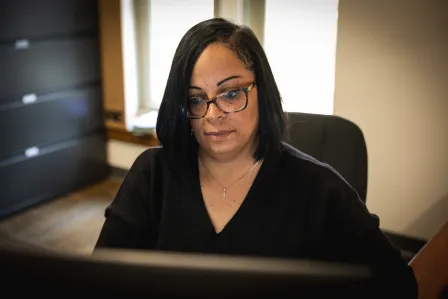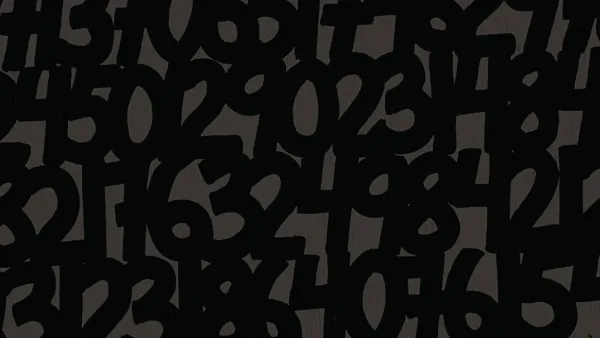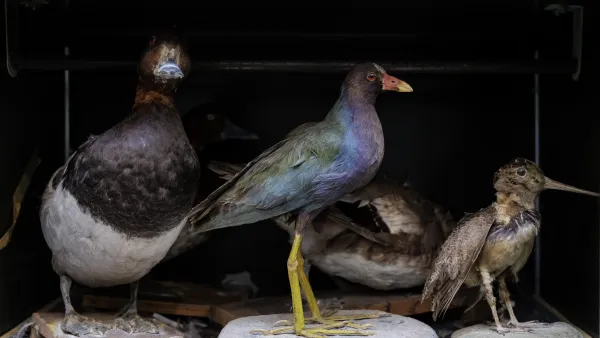A how-to for prospective grant & fellowship applicants in the humanities and humanistic social sciences
Trisha Sutton is a grants and budgets specialist as well as an administrative cluster supervisor based in the Center for the Humanities. She has helped faculty from across the humanities and humanistic social sciences to prepare and submit grant and fellowship applications big and small. With so many names and offices (and acronyms!) in the mix, we present this “read this first” interview with Trisha as a guide to the process of submitting external grants.
Where do I find out about humanities grants?
You can learn about grant opportunities and their deadlines on our External Funding Opportunities webpage. You can also read our periodic announcement emails! The Center for the Humanities facilitates invitation-only calls for proposals from ACLS, Mellon, NEH and others.

Do I need to work with you for every humanities grant? Even individual grants?
Yes, even if you are submitting as an individual, if your plan is to have the funds flow through WashU, then you will still need to notify me and provide me with a copy of your full proposal submission. All awards that flow through WashU must go through the pre-award process by entering all proposal information and documentation into the university’s Research Management System (RMS). This will streamline the post-award process if the grant is awarded. The award will then need to be profiled through the Office of Sponsored Projects (SPA).
Additionally, there are certain grants that require an internal competition because of limited submissions, such as the NEH Summer Stipend. The Center for the Humanities coordinates the process in those cases. The finalist(s) will work with me to submit the application to the funding organization.
What’s the difference between pre-award and post-award?
Pre-award and post-award basically define the life cycle of the grant from cradle to grave.
Pre-award
When a principal investigator (PI) decides to submit a proposal to a call for solicitation, they should take the following steps:
- Provide me with a copy or link to the solicitation. This gives me the opportunity to review the sponsor’s guidelines to determine eligibility, budgetary restrictions, indirect cost rates, etc.
- Plan a meeting to discuss drafting a budget to determine how the awarded funds will be spent, go over required proposal documents, and create a timeline for collecting and combining documentation and submission.
- Wait for approval. Before the proposal can be submitted to the funding agency, it must also be fully approved in the RMS system.
Post-award
If the grant is awarded, this takes the grant into the post-award process. Once the award notice has been received by the Office of Sponsored Research Services (OSRS) and the PI, I will provide the notice of award to SPA for award profiling. SPA’s profiling process consists of checking the PI’s compliance. Any faculty conducting research at Washington University must complete the Conflict-of-Interest Financial Disclosure Statement (FDS) and Financial Conflict of Interest Education training modules. Sponsored projects will not set up an award in Workday unless all compliance requirements have been met by the PI. Once all requirements have been met, the award will be set up in Workday and the PI will be notified of the grant number to begin spending.
Can you help me prepare a budget?
Yes! Once you have some idea of what categories for which you would like to request funding — for example, personnel, travel, outreach, etc. — the drafted figures are entered into the RMS system and from there the system will pull salaries from the HR system as well as calculate the indirect cost rates if applicable.

How else can the humanities center help with grants? Can you provide feedback?
Throughout the year, the center organizes several programs that can assist you in your external funding search. The Summer Research Seed Grant supports faculty who are preparing to submit an application to a peer reviewed, prestigious grant or fellowship competition during the following fall and/or spring. The deadline for this competition is usually in mid February.
The annual Scholarly Writing Retreat provides an opportunity to kick off your summer writing in a supportive and collaborative atmosphere. Participants work on everything from articles and book chapters to fellowship and grant proposals during this two-week writing-focused retreat. Because of the pandemic, we’ve hosted this in a virtual environment the past couple of years, but it’s also been held as an in-person activity.
Since 2014, the center has also hosted a Proposal-Writing Information Session and Workshop, nearly every year in late summer. The information session offers a section-by-section look at best practices for writing a proposal, as well as the hard-won experience of recent grant awardees.
Finally, we can help you network with previous recipients of a specific grant you are applying for to bring you together for review and feedback.
Which competitions qualify for the Competitive Leave Policy?
In November 2021, the dean’s office announced an update to the Arts & Sciences Competitive Fellowship Leave (CFL) program for faculty in the humanities and social sciences. The most substantive change to the policy is that in place of a predetermined list of fellowships that would qualify for the leave, a committee of senior faculty members, led by the vice dean of faculty affairs, has been constituted to review all applications and make recommendations to the dean of Arts & Sciences. Historically, qualifying fellowships included those from organizations such as the American Council of Learned Societies, Institute for Advanced Study at Princeton, National Endowment for the Humanities and National Humanities Center. Follow these links for the new policy and the application form.
Remember, the Center for the Humanities offers the Summer Research Seed Grant to support faculty who are pursuing these fellowships. This grant is offered annually, with a mid February deadline.
If the Office of the Vice Chancellor of Research (OVCR) advertises something I’d like to apply for, do I start with them?
No, the Office of the Vice Chancellor of Research is not able to assist with the pre-award process. I should be your first point of contact.
Do you handle only smaller grants? Can you help with projects that have bigger budgets and span several institutions?
I can help you with the full range, from individual to multi-institutional, regardless of the size of the budget. Ali Adams, the contract and grant coordinator in Arts & Sciences, is also able to assist.
When and how do I get started?
Once you’ve made the decision to submit, please notify me right away. Even if you’re not absolutely sure that you are going to move forward with the submission, still feel free to contact me. Oftentimes when we are undecided it helps to have a second set of eyes and ears to weigh the pros and cons of the grant submission process. Feel free to contact me with any questions you may have. Good luck on your submission!
You can contact Trisha Sutton at trisha.sutton@wustl.edu.
Headline image by Jon Tyson via Unsplash




